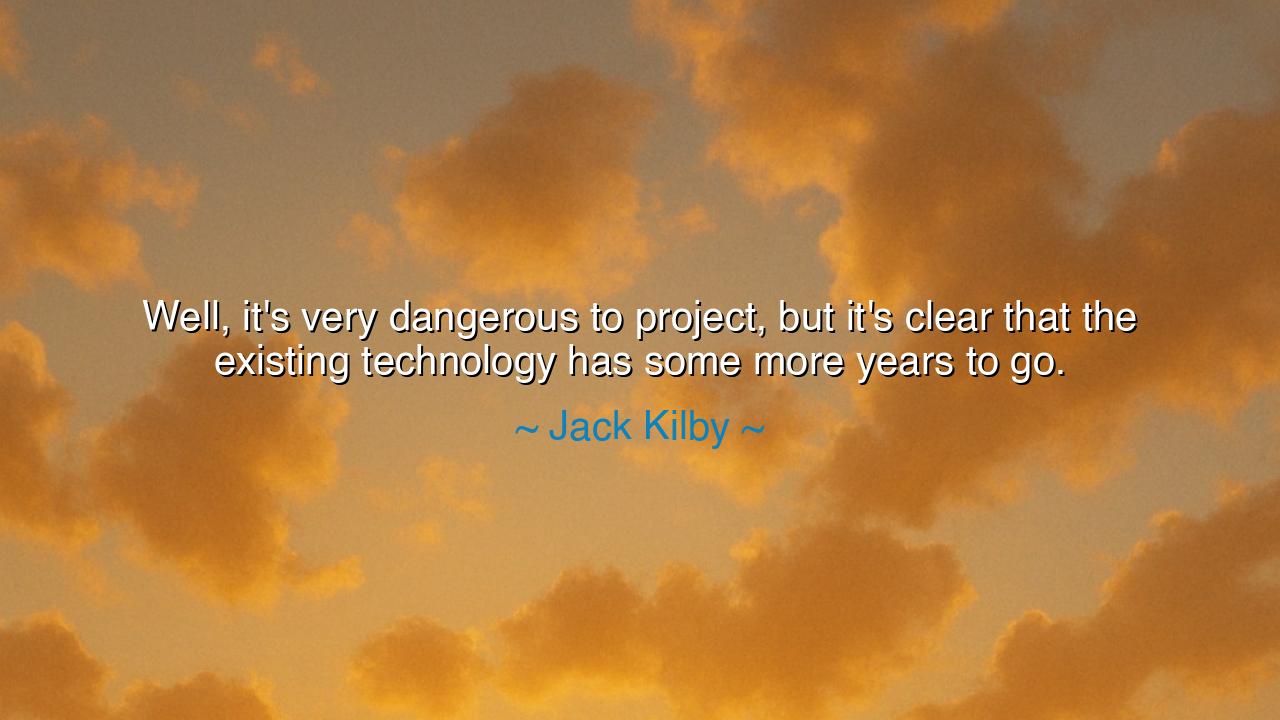
Well, it's very dangerous to project, but it's clear that the
Well, it's very dangerous to project, but it's clear that the existing technology has some more years to go.






Hear the words of Jack Kilby, the father of the integrated circuit, who declared: “Well, it’s very dangerous to project, but it’s clear that the existing technology has some more years to go.” Though spoken with modesty, these words carry the weight of a seer who glimpsed both the power and the uncertainty of invention. For Kilby, who gave the world the seed of the modern computer, knew that to speak of the future of technology is to tread upon shifting sands. Yet in his words lies both caution and hope—the warning not to presume too much, and the assurance that what we already hold still bears fruit for the journey ahead.
When he warns that it is dangerous to project, Kilby speaks of the folly of certainty in matters of progress. Too often, men have claimed that humanity had reached its peak, that no further invention was possible. In the 19th century, some declared that everything that could be invented already had been. Yet soon after came the telephone, the airplane, and the computer. Others, too, projected too boldly, promising flying cars for all by the year 2000. Both arrogance and despair lead to error. Kilby reminds us that technology does not obey the predictions of man; it unfolds according to its own hidden rhythm.
And yet, he also affirms that existing technology has life yet within it. This is the wisdom of patience: to recognize that the tools we already possess, though humble, may still carry us far. The wheel endured for millennia before giving way to engines. The printing press, once seen as the peak of human progress, shaped centuries before the digital age arose. In every season, the inventions of the present still bear use, even as they prepare the ground for what is to come. Kilby knew this well, for the integrated circuit he designed was but a small step—yet that step sustained decades of innovation and is still the foundation of the world’s devices today.
Consider the tale of the Wright brothers. Their fragile flyer of 1903 was a marvel, yet it was but the first breath of aviation. Some mocked it as a toy; others claimed it would never carry more than a single man. Yet within decades, the same principles carried hundreds across oceans. The existing technology of their wooden wings and sputtering engine still had years to give, inspiring a century of mastery. Kilby’s words recall such stories: never despise what is already here, for it may yet hold untold potential.
His wisdom also lies in humility. As a creator, Kilby did not claim to know how far his own invention would go. He did not speak as a prophet boasting of miracles, but as a craftsman who saw the unfolding of a seed. The integrated circuit, born of necessity when his company faced a challenge, became the root of microchips, computers, and the digital age. Yet he himself recognized the mystery of progress, that human hands may plant, but the harvest is not always foreseen.
The lesson is clear: treat technology with respect and patience. Do not presume to master its future, nor cast it aside too soon. What you hold in your hands today may still have years, perhaps centuries, of power. At the same time, be wary of certainty; leave space for wonder, for the possibility that tomorrow’s tools may arise in ways no one yet imagines. Balance caution with curiosity, humility with perseverance.
Practical action follows: use the tools of your time well, do not rush to discard them for the promise of newness, but also remain open to change. Study the past to see how inventions endure, and prepare your mind for the unexpected. If you are a creator, focus on the work before you, for no one can perfectly project where it may lead. If you are a seeker, walk with both patience and openness, ready to adapt when the season of change arrives.
Thus Kilby’s words, though simple, are profound. They remind us that the path of technology is not a straight line but a living current. It is foolish to claim to know its end, yet wise to recognize its enduring strength. Do not rush, do not boast, but walk humbly with invention, for what you hold today may yet shape the ages to come.






AAdministratorAdministrator
Welcome, honored guests. Please leave a comment, we will respond soon